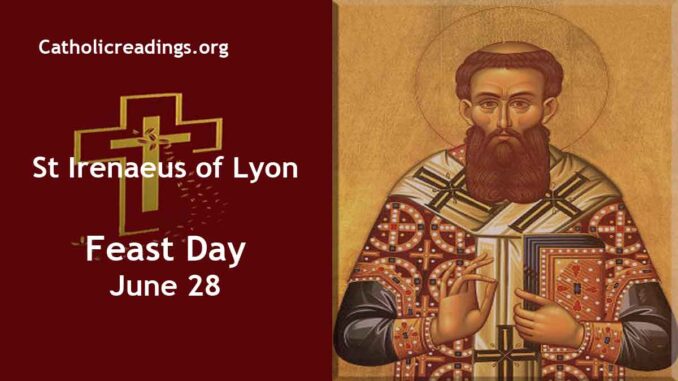St Irenaeus was the Bishop of Lyon, France.
He was born in 130 AD in Smyrna in Asia Minor now in modern-day İzmir, Turkey.
He died as a martyr in 202 AD in Lyon, France, previously called Lugdunum.
His feast day is celebrated on June 28 every year in the Catholic Church.
| Saint Irenaeus of Lyon, Bishop and Martyr Biography | |
|---|---|
 |
|
| Date of Birth | 130 AD |
| Place of Birth | Smyrna in Asia Minor now in modern-day called İzmir, Turkey |
| Profession | Bishop of Lyon, France and a Book Writer |
| Place of Work | Lugdunum in Gaul (modern-day Lyon, France) |
| Date of Death | 202 AD (aged 72) |
| Place of Death | Lugdunum in Gaul (modern-day Lyon, France) |
| Feast Day | June 28 |
| Canonization | Pre-congregation |
| Patron Saint of | Apologists and Catechists |
Saint Irenaeus of Lyon Life History
St Irenaeus was born in 130 AD in Smyrna, Asia Minor a town that is currently called İzmir, Turkey. From birth, he was brought up in a Christian family.
Irenaeus was a priest of the Church of Lyon, a time when there was great persecution by the regime of the Roman Emperor Marcus Aurelius.
In 177 AD, Irenaeus was sent by fellow clergymen to Pope Eleutherius in Rome concerning the Montanism heresy.
While in Rome, great persecution took place in Lyon and Pothinus, the then Bishop of Lyon died as a martyr. When Irenaeus returned, he was installed as the second bishop of Lyon.
As a bishop, St Irenaeus wrote a lot against Gnosticism and against Heresy. Around 190 AD he prevailed upon Pope Victor I not to excommunicate the Christian communities of Asia Minor who practiced the Quartodeciman celebration of Easter.
St Irenaeus was a prolific writer who wrote a number of books. An important and popular one was titled Against Heresies (Adversus haereses).
He talks about the Valentinian Gnostics and provides proof that Valentinianism contains no merit and shows that these doctrines are false by producing evidence from the Gospels.
Irenaeus insisted that people should not seek among themselves, the truth that they can easily get from the rich treasury of the Church. In this treasury, the apostles placed all that pertains to the truth.
He wrote the “Against Heresies” to refute the claims of Gnostic groups especially some Greek merchants who had begun to teach that the material world was the accidental creation of an evil god.
St Irenaeus classified the Old Testament but most of the books now known as the New Testament as Scripture and excluded many works by Gnostics that had allegedly claimed scriptural authority.
At that time, Christians had different preferences for the four Gospels. Those in Asia Minor preferred the Gospel of John but elsewhere, the Gospel of Matthew was preferred. St Irenaeus said that all the four Gospels, Matthew, Mark, Luke, and John, were canonical scripture.
St Irenaeus was one of the earliest people to attest that the Gospel of Luke was written by Luke, the companion of Paul, and the Gospel of John was written by John the Apostle.
St Irenaeus developed St Paul’s presentation of Christ as the Last Adam based on Paul’s comparison in Romans 5:12–21.
Irenaeus says that Jesus Christ truly took human flesh. He believes that humans were fully redeemed because the Word became flesh and that Christ restored man back to being in the image and likeness of God by becoming man himself after the Fall of man.
Irenaeus says that Adam was the original head of the man and through him, all humanity sinned, therefore, now Christ is the new head of man and it is he who fulfills the role of Adam of Salvation.
Irenaeus, says that St Paul wrote that the Mosaic covenant (Old Law) revealed man’s sinfulness but could not save them. Christ, through His obedience to die on the Cross, came to reverse Adam’s action of disobedience and therefore man is saved.
Saint Irenaeus was buried in a crypt under the altar of the Church of Saint John in Lyon, which was later renamed St Irenaeus in his honour. The tomb and his remains were all destroyed by the Calvinists in 1562, and there is no trace of his relics.
Saint Irenaeus Birth
He was born in 130 AD in Smyrna in Asia Minor now in modern-day called İzmir, Turkey
Saint Irenaeus of Lyon Death
He died as a martyr in 202 AD in Lugdunum now in modern-day called Lyon, France.
Relics
Saint Irenaeus was buried in a crypt under the altar of the Church of Saint John in Lyon, which was later renamed St Irenaeus in his honour. The tomb and his remains were all destroyed by the Calvinists in 1562, and there is no trace of his relics.
Saint Irenaeus Feast Day
His feast day is celebrated on June 28 by the Roman Catholic Church and Anglican Church and August 23 by Eastern Catholic Church, Oriental Orthodox and Eastern Orthodox and Churches.
Veneration
Saint Irenaeus is recognized and venerated in the following Churches
- Roman Catholic Church and Eastern Catholicism
- Oriental Orthodox Church
- Lutheran Church
- Eastern Orthodox Church
- Assyrian Church of the East
- Anglican Communion
Saint Irenaeus is the Patron Saint of
He is the patron saint of Apologists and Catechists
Today’s Catholic Quote
Jesus Christ, in His infinite love, has become what we are, in order that He may make us entirely what He is.

Related Links
Powered By SEO Experts
Follow @ReadingCatholic